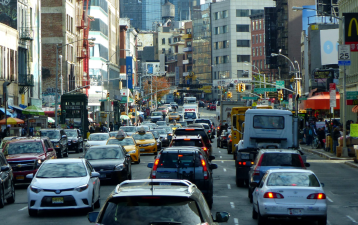NYC Voters Oppose Pricing Unless it Helps Prevent a Fare Hike
A new Quinnipiac Poll shows that New York City voters would support congestion pricing by a 53-41 margin if it "prevents a hike
in mass transit fares."
The new poll also shows that a majority of voters still oppose the idea of congestion pricing by a margin of 61 to 33. Support for Mayor Bloomberg’s plan seems to be falling off in Manhattan, in particular. City Room notes: "Manhattan voters, who supported congestion pricing by a margin of 54
percent to 36 percent in Quinnipiac’s last such poll, in August, are
just about evenly split, with 46 percent supporting it and 47 percent
opposed."
The other boroughs break down like this:
- 65 – 29 percent in Queens;
- 63 – 31 percent in Brooklyn;
- 70 – 24 percent in The Bronx;
- 63 – 34 percent in Staten Island.
While the news is sure to be spun by opponents as a definitive upsurge in
opposition, last August’s Q-Poll came in at 57 to 36 — essentially the same
as today’s when you factor in the 3 percent margin of error. And, as always, it is worth noting that prior to the implementation of Stockholm and London’s congestion pricing systems, polls showed opposition as high as 80 percent. After the implementation of both of those cities’ congestion pricing systems, public sentiment turned around almost immediately as people enjoyed the benefits of reduced traffic.
Still, advocates would be wise not to pretend that these poll numbers are good news. Rather, we ought to be asking why it is that support is dwindling for a transportation policy that would benefit 95 percent of New York City workers who commute into the Central Business District. Aside from the fact that car culture is absurdly powerful and imposing a new fee on New Yorkers is always going to be a tough sell, I’ve got some ideas:
- The MTA’s refusal to link congestion pricing to fare hikes has been devastating. Poll after poll shows New York City voters would support congestion pricing if it were used to prevent bus and subway fare hikes. The MTA, however, insists on keeping the fare and toll hike discussion on a completely separate track from Mayor Bloomberg’s congestion pricing plan. Congestion pricing could provide the MTA with a steady source of revenue and bonding for decades. It’s the most important transportation policy reform since the formation of the MTA itself in 1968. The MTA needs to snap out of its bureaucratic inertia, look beyond its short-term bottom-line and make the connection.
- City Hall’s political operation is nowhere to be found. New York City has $300+ million in immediate bus improvements hanging by a thread. If congestion pricing is rejected, that federal money is gone. You’d think that the powerful Transit Workers Union and a few hundred thousand outer borough bus riders would be interested and could be organized to rally support for the Mayor’s plan. But that’s a lot of work and no one is doing it. To the contrary, Mayor Bloomberg has been antagonizing the transit workers lately. These guys could be congestion pricing’s best political foot soldiers but they’re standing on the sidelines.
- Institutional dysfunction in Albany makes good policy-making virtually impossible. So, where has Governor Spitzer been on this issue anyway? Oh, right, when not squandering his own political capital he’s been trapped in the StoneZone, busy defending himself from Senate Leader Joe Bruno’s political goon squad and freak show. Meanwhile, the cowardice among state legislators representing districts with low rates of car
ownership, crushing traffic congestion and heavy transit dependence is
simply staggering. Why is it that not a single state legislator from Lower Manhattan or Downtown Brooklyn has been willing to stand up and say that Mayor Bloomberg’s pilot project is, at the very least, worth a try? How has the New York City Assembly delegation ceded transportation reform leadership to Richard Brodsky, an Assemblyman from the car-dependent suburbs? Read former State Senator Seymour Lachman’s book, "Three Men in a Room" for some answers to these questions. Albany needs to be blown up and rebuilt. When is the next Constitutional Convention again?
